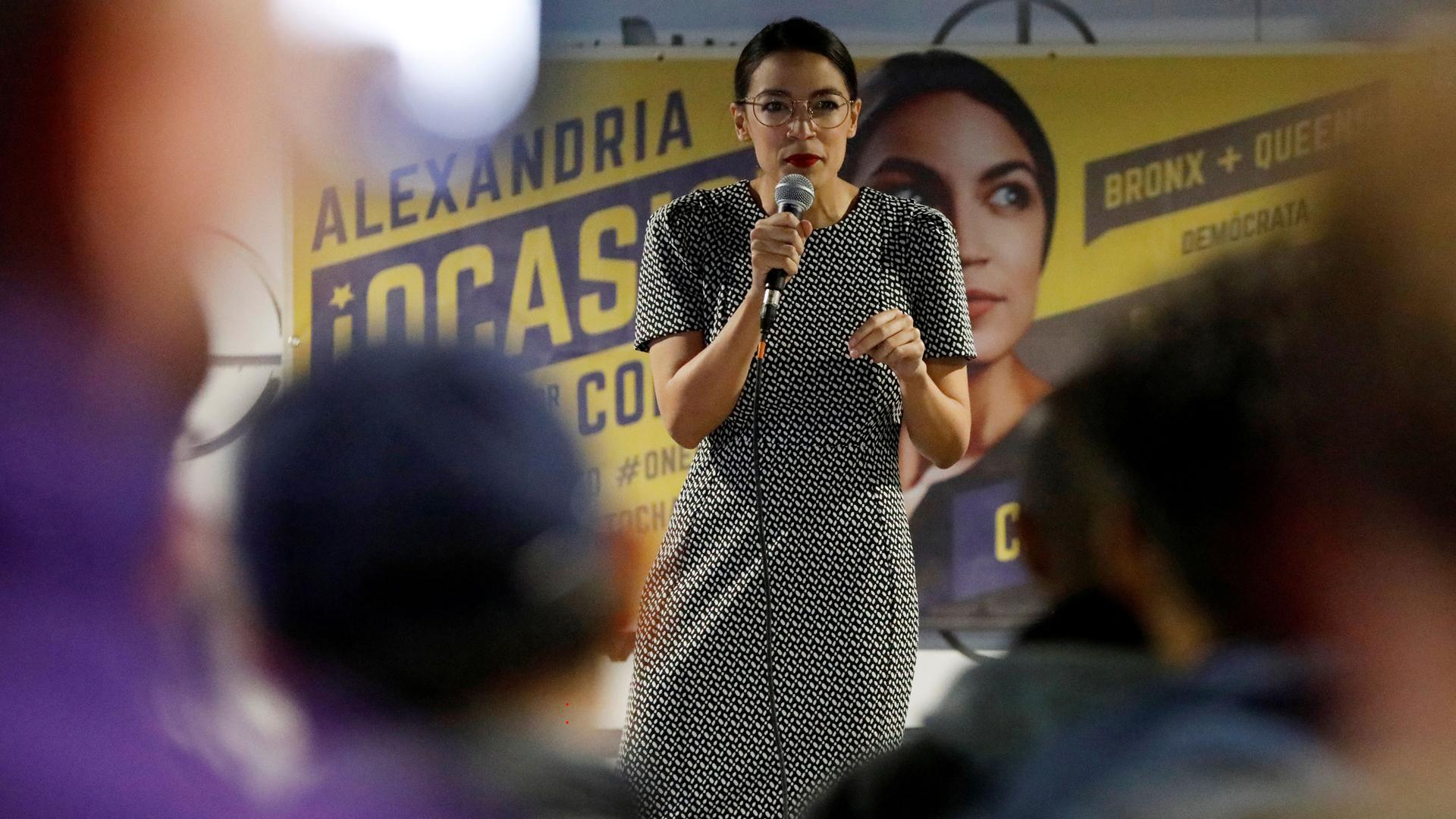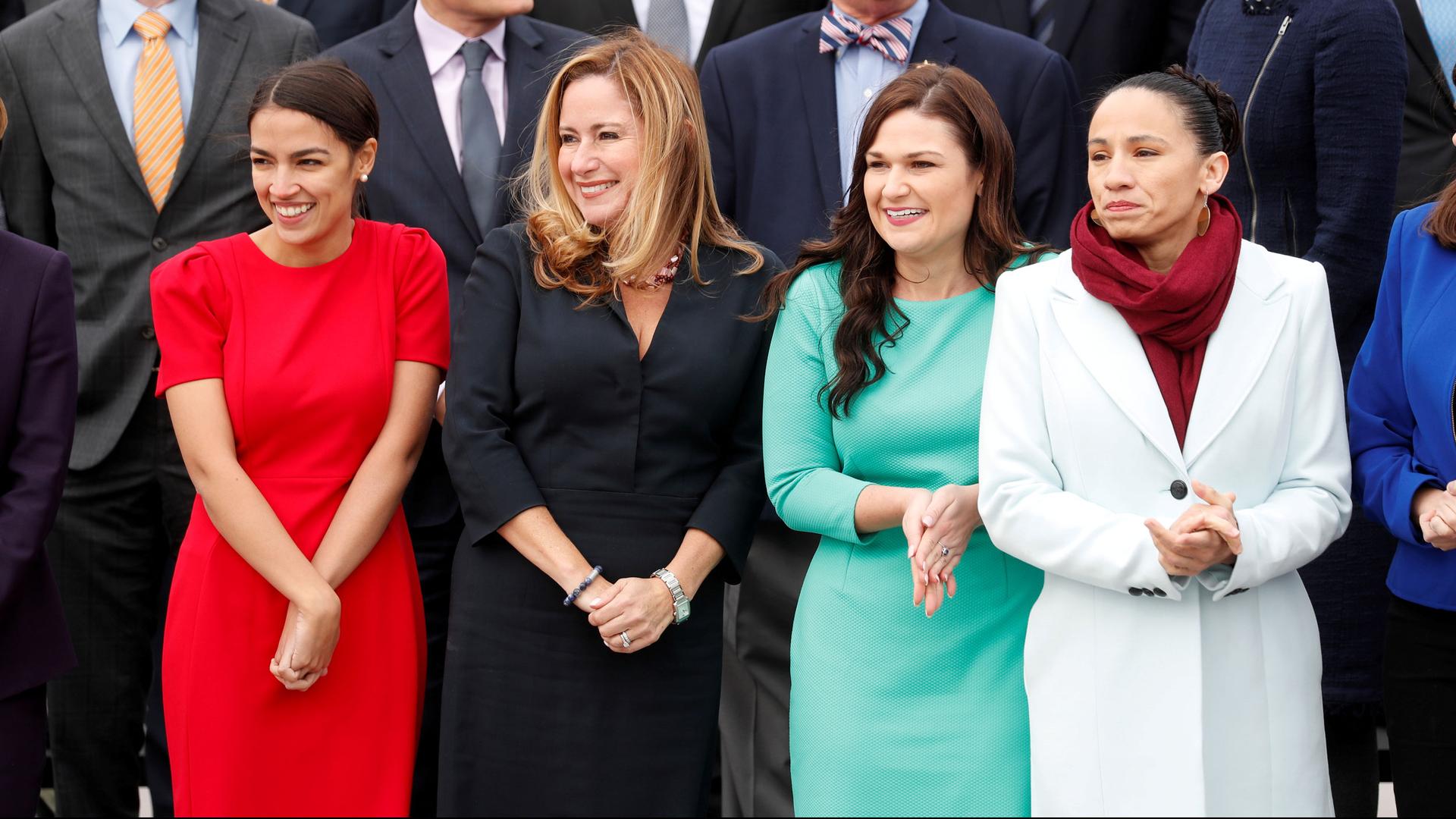You’re young and broke. Here’s how to still win a congressional seat.
Female Democratic Representatives-elect (from left to right) Alexandria Ocasio-Cortez of New York, Debbie Mucarsel-Powell of Florida, Abby Finkenauer of Iowa and Sharice Davids of Kansas pose together in the front row during a class picture with incoming newly elected members of the US House of Representatives on Capitol Hill in Washington in November 2018. Oscasio-Cortez and Finkenauer are both under 30 and aren’t independently wealthy, unlike much of Congress.
Democrat Alexandria Ocasio-Cortez, 29, won her US House race in New York. But on her road to becoming a heroine of progressives and media darling, she had to dip into her savings, leaving her with less than $7,000 stashed away. Her 2017 income: less than $27,000.
Democrat Abby Finkenauer, 29, won her US House race in Iowa, continuing on her fast track up the political ladder after securing a state House seat at age 25. She prevailed while paying off roughly $20,000 worth of debt after attending Drake University in Des Moines. Her 2017 income was $25,000.
These women are the exception to the rule: Most members of Congress are rich.
But many find that troubling. If candidates by and large need to be wealthy to run, is that good for democracy?
Related: These are the women who made history in this year’s midterm elections
What if you want to run for Congress but are broke, or young and saddled with thousands of dollars of student loans? You’re entering a realm where the campaign with the most money usually wins. Being rich also means you likely know other rich people who can write big checks to your campaign. And no public financing program exists — like on the presidential level and in some states — to help congressional political prospects with big brains and full hearts … but empty wallets.
Here are several ways pauper politicos can subsist and keep themselves solvent when campaigning becomes their full-time gig:
Pay yourself a wage
If you’re not an incumbent federal lawmaker, you’re allowed to take a salary from the campaign funds you raise.
Really.
The Federal Election Commission passed this measure back in 2002 to help “candidates of modest means [who] too often have been crowded out of running for office.” The rule “may allow people like blue-collar workers, school teachers and others who don’t make six-figure salaries to run for office,” Republican FEC Commissioner Michael Toner said at the time.
How much can you pay yourself? Whichever is less money: Your income from the previous year — so Finkenauer could pay herself $25,000 — or the salary of the position you’re running for, which is $174,000 for a rank-and-file member of the US House or US Senate.
Most candidates don’t take advantage of this provision. But a Center for Public Integrity analysis of federal campaign finance disclosures identified at least 22 candidates running in the 2017-2018 election cycle that together paid themselves about $155,000 from campaign funds. None of the candidates the Center for Public Integrity identified this cycle appeared to collect a $174,000 salary.
Ocasio-Cortez’s campaign paid her $6,199.42 over the last few months of the campaign, while Finkenauer did not report any salary from her campaign. Democratic musician Robert Quist, who ran and lost against Greg Gianforte for Montana’s US House seat in a 2017 special election, paid himself a salary totaling $9,000.

Work … and run
Laura Lombard, 34, kept her job as the chief executive officer of ImEpik LLC, an online training company, while she unsuccessfully ran for Congress as a Democrat in Kansas’ 4th District, both during a 2017 special election and a 2018 Democratic primary ahead of November’s election.
Lombard ran her company from her home during morning hours, starting at 6 a.m. She’d usually pivot to congressional campaign work during the afternoons and fundraise, canvass and attend events into the evening. Federal laws don’t generally prevent unelected congressional candidates from holding jobs.
“I don’t think a lot of people realized that I was doing both,” Lombard said. “I tried to make it look like I was fully campaigning, and to my job, I had to show them it had my full attention. It definitely took a physical and financial toll on me.”
In all, Lombard reported that she personally gave or loaned her congressional campaign committee about $10,000, which “hurts,” she said.
“I would rather have not have done that,” she said. “But is it recoverable? Yeah. I have my salary.”
Related: After midterms, women fill a new-look Congress
Hire family members
You may put a family member on your congressional campaign payroll — which would help boost your household income — as long as you’re paying fair market value for the services they’re providing.
Hiring relatives may make sense, financially and otherwise: You trust them; they know you and the community well.
But problems loom.
Hiring your spouse as a consultant or record keeper may reek of nepotism, which an opponent could use against you.
Employing a relative also could generate awkwardness if things go sour. Exhibit A: California Republican Rep. Duncan Hunter, who was indicted in August for allegedly misusing more than $250,000 of campaign funds. In news reports, Hunter appeared to blame his wife, Margaret (who was also indicted), for the financial mess. “She was also the campaign manager, so whatever she did that’ll be looked at too, I’m sure,” Hunter said.
Paying relatives to work on a congressional campaign occurs to some degree each election cycle. A USA Today investigation found that 32 members of Congress together paid relatives at least $2 million during the 2012 election cycle. A 2017 analysis by The Hill identified at least 13 lawmakers with family members paid as campaign staffers.

Know what’s fair game
The basic rule of spending: “Using campaign funds for personal use is prohibited.”
So what is considered “personal use?” Basically, don’t use campaign funds for expenses that would have existed even if you weren’t running for Congress. Think mortgage, rent, utility bills — even if you’re running your campaign operation from your living room.
“It’s important to emphasize the reason for these limitations: If a candidate is using contributions just to subsidize their lifestyle, that money poses a serious risk for corruption,” said Brendan Fischer, director of federal reform at the nonpartisan Campaign Legal Center. “It’s a necessary check on that influence.”
There are, however, some curious exceptions, according to federal election rules:
- Your congressional campaign can’t pay for funeral, cremation and burial expenses for your family members. You may, however, pay for these services for a campaign worker “whose death arises out of, or in the course of, campaign activity.” For instance, Rep. Danny Davis, a Democrat from Illinois, paid more than $5,300 to Dove Funeral Home and Garfield Waters Funeral Home in 2013 for “funeral of a campaign worker,” according to data from the nonpartisan Center for Responsive Politics.
- If a candidate conducts a campaign activity, such as a fundraiser, at a sporting event, concert or a theater show, campaign funds can pay for the ticket. But you better talk politics: The FEC warns that money can’t be used for “a leisure outing at which the discussion occasionally focuses on the campaign or official functions.”
- Membership dues for a political organization are fair game. But you can’t use campaign money to pay for country clubs, health clubs, recreational facilities or similar organizations. While his case didn’t specifically involve a gym membership, Rep. Gregory Meeks, a Democrat from New York, agreed to pay a $63,000 civil fine to the FEC for using $6,230 worth of campaign funds for a personal trainer, among other things.
There have been many FEC complaints dealing with this issue, but most are dismissed “on the theory that belonging to these clubs allows members to interact with their constituents,” said Brett Kappel, a partner at Akerman LLP. One odd example? Rep. Gus Bilirakis, a Republican from Florida, paid $805 for membership dues to the invite-only Shriner-linked Royal Order of Jesters, whose purpose is “spreading the gospel of mirth, merriment and cheerfulness.” Bilirakis argued the group “is a Masonic fraternity that clearly qualifies as a civic or community organization.” The FEC failed to find he violated the law and closed the file. - Tuition payments are generally not allowed, but there are special circumstances: In 1997, the FEC allowed Rep. Lucille Roybal-Allard, a Democrat from California, to pay for a language immersion program to improve her Spanish, which would enable her to better communicate with her constituents.
- In 2017, the FEC said members of Congress could use campaign funds for home security system installations or upgrades. However, this opinion specifically covered federal legislators, not unelected candidates.
- You can purchase clothing with your campaign slogan, such as pins or shirts or “Make America Great Again” hats, but you can’t finance a wardrobe for political functions. Read: No shopping sprees at Nordstrom or Brooks Brothers. Democrat Liuba Grechen Shirley, who lost to Republican Rep. Peter King in New York’s 2nd District race, said she rotated through the same J. Crew dress in four different colors, mixing it up with a new blazer or sweater. “You wear the same things over and over!” she said. “Someone came up to me and said, ‘I love that you have a signature dress.’ That’s one way to put it.” What not to do: The Hunter indictment alleged Duncan and Margaret Hunter “bought personal clothing items at a golf course” and falsely reported the expense as “balls for the wounded warriors.”
Get campaign-subsidized child care
For the first six months of Shirley’s congressional campaign, she made fundraising calls from her house as she nursed her then-1-year-old son Nicholas. Three-year-old daughter Mila would play with her hair.
Shirley — formerly a nonprofit consultant who worked from home and took care of her kids — said her family relied on her husband’s wage from engineering services firm WSP USA during her campaign. His salary barely covered their bills and Shirley’s $1,000-a-month student loan payment.
Then, in January, shortly after she began campaigning, her son tripped on a toy and broke his leg, which required a full body cast. The hospital bills piled up.
“I really wasn’t sure how I was going to make it financially,” Shirley said.
So Shirley petitioned the FEC to allow her to use campaign funds to hire a part-time babysitter so she could go campaign.
In May, the FEC unanimously approved Shirley’s request.
This was the first time the FEC gave such express permission to a female candidate: In 1996, the commission allowed Republican Rep. Jim McCrery from Louisiana to hire a babysitter, as he argued that it was vital that his wife — his infant son’s primary caretaker — attend certain campaign events with him. The FEC said yes, “because the child care expenses will be incurred only as a direct result of campaign activity and would not otherwise exist.”
It’s an important distinction: If a candidate already paid for a babysitter before running for office, that particular campaign expense wouldn’t fly.
Shirley reported spending $3,632 for child care services in her FEC filings, one of nine candidates Roll Call identified who reported taking advantage of the FEC’s child care decision this cycle.
Use volunteers to offset expenses
Certain actions with intrinsic value can be considered a “volunteer activity” as opposed to a campaign contribution, which are capped at $2,700 per election.
If, for example, you have a well-connected friend willing to host a campaign fundraiser at his or her home, that friend may also spend up to $1,000 on food, drinks and invitations before it must be reported to the FEC. That’s a $1,000 bill (plus the value of the venue) your campaign doesn’t have to foot.
Your political backers may also send emails in support of you, or create and host a website that sings your praises, without having to financially account for such activity. The FEC is even considering whether a supporter could mine bitcoin and donate the spoils to your campaign, calling the process a volunteer expense.
Every bit helps for a new candidate who lacks the political networks and infrastructure that most sitting lawmakers possess.
“There’s a lot of ground that needs to be made up by first-time candidates,” said Will Levitt, the co-founder of Square One Politics, which aims to break down barriers to entry for new Democratic candidates. “It’s important to make sure they’re aware of the financial rules and what some of their biggest roadblocks may be.”
Lombard, the candidate from Kansas, may again run for Congress. She estimates she spent four hours a day making fundraising calls, and experts told her each call should last a minute if she’s doing the job right. That’s hardly enough time to properly explain her campaign platform.
“I wish that money was less of an issue, so I could go out and meet the people in a stronger way,” Lombard said. “That would make a huge difference, not just for the success of the candidate, but for how our politics are done in this country.”
Our coverage reaches millions each week, but only a small fraction of listeners contribute to sustain our program. We still need 224 more people to donate $100 or $10/monthly to unlock our $67,000 match. Will you help us get there today?
